

The Iliad begins at a point almost ten years into the Trojan War. Agamemnon is the leader of the Greek forces encamped on the beach beneath Troy, with their warships drawn onto the shore. The Greek forces have had some success, even if they haven’t breached the walls of Troy, since their powerful leaders have been awarded prizes, captured as a result of their campaign. These prizes include beautiful women who will, willingly or not, become the lovers of their new commanders. These prizes are important to assure the status and honour of these rulers since the Greek forces, given the nature of Greece, itself – a series of city States with a common culture but not necessarily the same political backgrounds – are led by the individual commanders, but they have ceded overall command of their forces to Agamemnon, the king of Mycenae from the Peloponnese.
This situation proves instrumental when Chryses, a faithful priest to the God Apollo, pleads with Agamemnon to return his daughter, Chryseis, to him. Agamemnon refuses, despite the sympathy the Achaeans generally express for Chryses in this situation. Rebuked, Chryses prays to Apollo for revenge against the Greeks – “pay the Danaans back – your arrows for my tears!” – and Apollo obliges. He sends rains of arrows for 9 days into the Greek forces, killing many men. Achilles calls a meeting of the army, wanting to discuss the reason for the God’s wrath. In the meeting, Calchas, a seer gifted by Apollo to be able to see the future by observing the flights of birds, is called upon to speak. Fearing retribution if he reveals the truth, he asks for protection before revealing what he knows. This given, he identifies Agamemnon as the source of the God’s wrath, for taking Chryseis from her father, Chryses, and says that their trouble will not end until the girl is returned to her father. Agamemnon is angered. He prefers Chryseis to his own wife, Clytemnestra, but he agrees to give up the girl for the sake of the army. However, at stake is not just the girl, but the honour she represents. It seems ignominious to Agamemnon that he should have no prize, as leader of the Greek forces, when others below his rank will keep theirs, and asks that another girl be found for him.
Achilles responds, saying that Agamemnon should give up the girl and expect no prize until Troy is defeated, since all prizes have already been distributed among the men. Agamemnon intimates that he might take the prize of one of his commanders, perhaps even Achilles’s own. This angers Achilles. Achilles points out that he has come to Troy for Agamemnon’s glory, since he does not see the Trojans as a personal threat. They are too far from his own country to have come into any conflict with them. Achilles believes he fights harder than anyone, and is insulted that Agamemnon might take his reward. He threatens to leave and return to Phthia with his forces. Agamemnon is also angry, now, and tells Achilles to go, but announces he will send someone to Achilles’s tents to take his prize, the girl Briseis. Achilles is so angered that he moves to kill Agamemnon. But the Goddess Athena, sent by Hera, intervenes. Only Achilles can see her. She tells him not to kill Agamemnon, and that he will eventually be rewarded. So Achilles stays his own hand and instead abuses Agamemnon, suggesting he is a coward and a bad leader. He swears by his sceptre that sometime in the future Agamemnon and his forces will suffer losses and they will long for Achilles to return. Nestor, as a wise old counsellor with a history of good counsel, attempts to intervene in the argument, and demands reason from both men. Agamemnon sees Achilles outburst as a threat to his own power. But Achilles, angry as he is, agrees to allow Briseis to be taken from him without any struggle.
Chryseis is returned to her father while Talthybius and Eurybates are sent to collect Briseis from Achilles. Agamemnon tells them that if Achilles resists, he is willing to go to war over the matter. But Achilles keeps his promise and puts up no resistance, and makes it clear that he holds no personal grudge against Talthybius and Eurybates for following their orders. Once Briseis is taken Achilles goes to the beach where he weeps with rage and frustration. He prays to his mother and father. His mother, Thetis, who is a Nereid (a sea nymph), rises from the waves and comforts him. He recounts to her what has happened, and recalls that Zeus is indebted to her because she used the hundred-handed giant, Briareus, who broke the chains used by Hera, Poseiden and Athena to hold him down. Achilles asks his mother to use her influence to persuade Zeus to turn the tide of the war against the Greeks. Thetis weeps for her son who, she says, is doomed to a short life. She promises to seek Zeus’s help. She asks that Achilles remain by the ships and not engage in any fighting.
Meanwhile, sacrifices are made to Apollo after the return of Chryseis to her father, and Chryseis asks Apollo to cease his campaign against the Greeks.
When Thetis requests Zeus’s help on her son’s behalf he agrees to turn the war against the Greeks, but he is concerned that Hera, his wife, will hear their plotting. It turns out, his concern is well founded. She has heard and she confronts Zeus. Zeus, angry, tells her to be quiet. Intimidated, she backs down, and her fear is felt by the other Gods of Olympus. Hephaestus, her crippled blacksmith son, warns against an open conflict with Zeus, who, he says, will be too strong. Hephaestus tells Hera that he cannot help to protect her because Zeus is too strong. He has previously suffered Zeus’s wrath when he was flung from Olympus by the foot. Hera accepts Hephaestus’s advice, and the conflict seems averted as the Gods begin a feast.
Achilles is the main character in The Iliad. It is his refusal to fight on the Greek side against the Trojans, and Zeus’s agreement to turn the war against the Greeks to satisfy Achilles’s desire to punish Agamemnon, that is central to the whole story. By modern standards, Achilles’s anger at losing Briseis, his ‘prize’, may seem petulant, but it is no more so than Agamemnon’s desire to take Briseis as his own, partly as a matter of honour, and partly to pay Achilles back for speaking against him. The importance attached to these ‘prizes’ is paramount, for it helps establish relative power and status among the commanders in a world that is violent and in which reputation is therefore critical. To have willingly acquiesced to Agamemnon’s demand would have diminished Achilles’s standing among his men, and undermined his own sense of destiny, which is to live a short but glorious life.
Agamemnon is leader of the Greek forces, but under him are commanders who would have been independent rulers in their own city states were it not for this conflict. Achilles is one of those commanders. He has brought with him 50 ships, each carrying 50 Myrmidons, and by reputation he fights harder than anyone else. It would seem politic, then, not to cross Achilles needlessly. To have done so raises questions about Agamemnon’s political acumen, as well as his personal self-control. His surrender of Chryseis could have been spun as a magnanimous action of a leader. Instead, he allows his conflict with Achilles to descend into a petty argument in which he is accused of leading the Greeks poorly and being a coward.
Apollo’s intervention on behalf of Chryseis shows he is loyal to direct servants rather than the Greeks. His intervention is not on his own behalf and he seems to willingly call it off once Chryseis is returned. The main aspect of Apollo’s many talents which is emphasised in Book 1 is his skill with the bow.
Athena is aligned against the Trojans because of the judgment of Paris. This was a competition in which Paris judged the most beautiful Goddess. He awarded the prize to Aphrodite, thereby incurring Athena’s wrath. Her intervention to spare Agamemnon from Achilles’ wrath is an attempt to avoid what would inevitably become a civil war between Greek forces. Nevertheless, she cannot prevent the argument that results in Achilles withdrawing from the conflict.
Briseis is a young woman who is Achilles ‘prize’, taken by Agamemnon for his own when he is forced to return his own prize, Chryseis, to her father. This is the action that begins the feud between Agamemnon and Achilles. In paintings, like Jean-Baptiste-Henri Deshays ‘Briseis Led from the Tent of Achilles’ she is often portrayed as tearful as she is taken from Achilles.
Hephaestus is the god of the forge, smiths, and craftsmen. In Book 1 of the Iliad he reminds his mother, Hera, how he was once thrown from Olympus by Zeus, to persuade her to avoid open conflict with Zeus. His position reveals him to be aware of his relative weaknesses as well as astute in his judgement.
Thetis is a sea goddess, wife of the warrior, Peleus, and divine mother of Achilles. In Book 1 she intervenes in the argument between Achilles and Agamemnon by asking Zeus to turn the tide of the war against the Greeks at Achilles’s request.
Zeus is the son of Kronos and most powerful of the gods. He is brother of Poseidon, Hades and the goddess, Hera, who is also his wife. Thetis once saved Zeus from their combined rebellion, so he now looks favourably upon her. He agrees to Thetis’s appeal to turn the battle against the Greeks, as Achilles has requested, against the interests of his wife (and sister) Hera.
While The Iliad may have some basis in a history which is now mostly lost to us, it also incorporates mythical elements, such as the intervention of the Gods Apollo, Athena, Hera and the nereid Thetis in the opening book. However, there are other allusions to Greek myth that are not directly a part of the story of Troy. Here are a couple from the first book:
These lines refer to a time when Hera rebelled against her husband because of his “pride and petulance” (to use the words of Robert Graves). Hera, along with Poseidon, Apollo and other Olympians, gathered around Zeus as he slept and bound him. They refused to release him, though he threatened them with death. Thetis, Achilles’s mother, with the help of Briareus who possessed a hundred hands, was able to free Zeus be removing all his bonds at once. Zeus then punished Hera for leading the rebellion. He hung her from the sky with a bracelet on each wrist and an anvil on each ankle to weigh her down and increase her pain. Zeus only freed her when the other gods swore never to rebel against him again.
This is Hephaestus talking to his mother, Hera, urging her not to confront Zeus openly. They have both fallen foul of his power in the past. Hephaestus is remembered as the crippled smith-god of the Olympus, and this story tells us how he was injured when he was thrown from Olympus by Zeus. It was the second time, in fact, that he had been dropped from Olympus. He was originally dropped by his mother, Hera, at birth, because he seemed sick and weak. But that first time he landed uninjured in the sea, where Thetis and Eurynome raised him and set him up with his first smithy. He returned to Olympus years later when Hera saw some of his work. She set him up with a workshop in Olympus. Zeus flung Hephaestus from Olympus the second time for speaking against his mother’s punishment, to be hung from the sky, after she led her rebellion against Zeus. This time, Hephaestus broke both his legs, and when he returned to Olympus he could only walk with the aid of supports.
Nestor is an old man by the time of The Iliad. He remains out of the fighting but often gives advice to others. In this first book Nestor calls upon his former achievements when he intervenes in the dispute between Achilles and Agamemnon:
Nestor, as an older man in The Iliad often gives advice, but he is also known to preface his advice with talk of his own past deeds. Nestor was a part of the crew on the Argo, the ship that sailed to find the Golden Fleece, as dramatized in Don Chaffey’s 1963 film featuring the famous stop-motion animation of Ray Harryhausen, Jason and the Argonauts. In this speech he also alludes to his association with famous Greek heroes like Theseus, who slew the Minotaur, or Dryas, who helped defend Thebes against the seven champions who sought to install Polynices on the throne. Nestor seeks to command respect and justify his assumed role as arbiter between Achilles and Agamemnon.
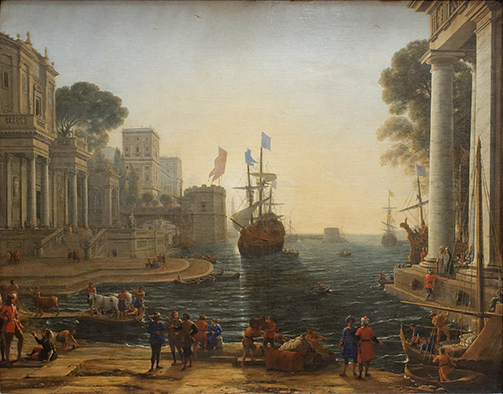
In this scene Odysseus (known as Ulysses to the Romans) obeys Agamemnon’s order to return Chryseis to her father
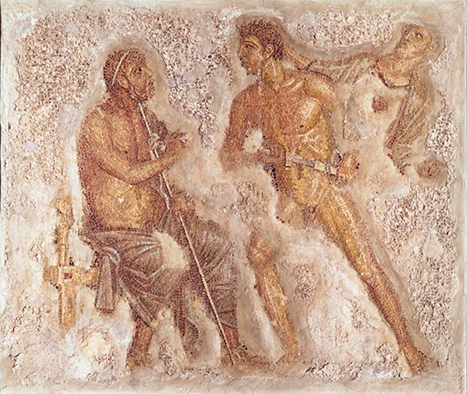
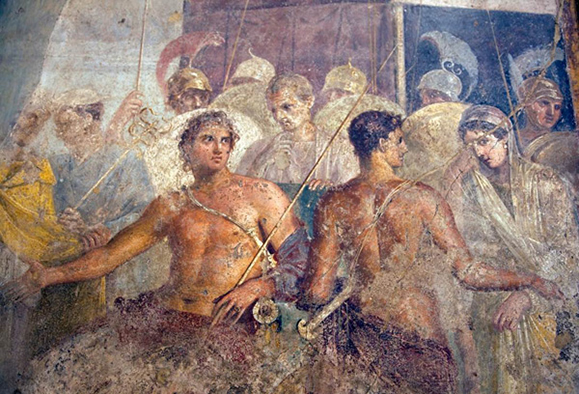
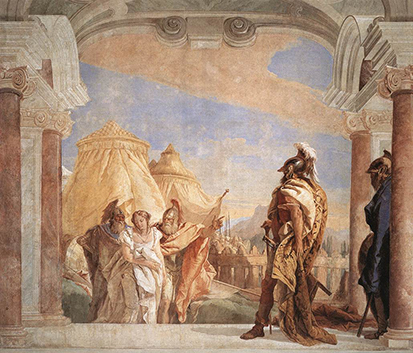
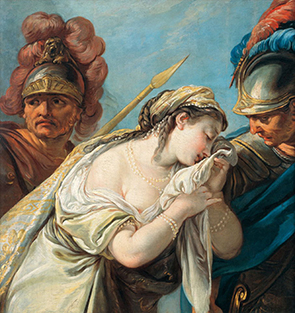
Representations of Briseis’s removal from Achilles’s tent often portray her as sad or in tears, interpreting the story as a couple torn apart by Agamemnon. But The Iliad makes clear that women were considered prizes in war, conferring status upon those awarded them. Nevertheless, we might imagine that the situations were complicated. The modern concept of Stockholm syndrome could just as easily apply to ancient times, and women’s status was different in Ancient Greece. Even in fifth century Athens, seen as a progressive society for its art and democracy, women were subject to their husbands and family, and lived private lives mostly guarded from the public. For this reason, they were financially dependent. During periods of war, I imagine their loyalty would necessarily be given to whomever was their protector.
Comments
No one has commented yet. Be the first!